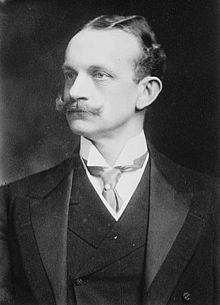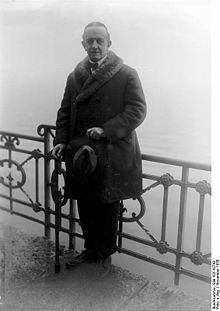- Johann Heinrich von Bernstorff
-
Johann Heinrich von Bernstorff 
Bernstorff in 1908 German Ambassador to the USA and Mexico In office
1908–1917German Ambassador to the Ottoman Empire In office
1917–1918Reichstag In office
1921–1928Personal details Born November 14, 1862
London, United KingdomDied October 6, 1939 (aged 76)
Geneva, SwitzerlandPolitical party German Democratic Party (DDP) Spouse(s) Jeanne (Johanna) Luckemeyer (1867–?) Children Luise-Alexandra (1888–1971)
Christian-Günther (1891–1947)Johann Heinrich Graf[notes 1] von Bernstorff (14 November 1862 – 6 October 1939) was a German politician and the ambassador to the United States and Mexico from 1908 to 1917.
Contents
Biography
Early life
He was born in London, where his father Albrecht von Bernstorff was the Prussian and Imperial German ambassador, and lived in England until his father's death in 1873. He joined the Prussian Army and served as an officer for eight years, his last position was a military attaché in Constantinople. Bernstorff married the German-American Jeanne Luckemeyer in 1887.[1] In 1892 he left service and joined the German diplomatic corps[2]. He was deployed at the German embassies at Belgrade (1892–94), St. Petersburg (1895–97), London (1902–06) and Cairo (1906–08).[3]
Bernstorff's diplomatic skills were noted in Berlin throughout the First Moroccan Crisis in 1905 and he was appointed the German ambassador to the United States and Mexico in 1908.[4]
Ambassador to the United States and Mexico
He was recalled to Germany on July 7, 1914, but returned on August 2. It was later revealed that he had been recruited into intelligence work and ordered to assist the German war effort by all means necessary. He was also provided with a large slush fund to finance these operations. He began with attempts to assist German-Americans who wished to return home to fight by forging passports to get them through the Allied blockade.
Later, however, as the Blockade began to prevent American munitions manufacturers from trading with Germany, the Ambassador began financing sabotage missions in order to obstruct arms shipments to Germany's enemies. Some of the plans included destroying the Welland Canal, which circumvents Niagara Falls. This was attempted in September 1914, but failed. It was also in 1914 that the German diplomatic mission began supporting the Expatriate Indian movement for independence.
Bernstorff was assisted by Captain Franz von Papen (who would later be Chancellor of Germany) and Captain Karl Boy-Ed, a naval attaché. The commercial attaché, Heinrich Albert would be the finance officer for the sabotage operations. Papen, as well as the German consulate in San Francisco, are known to have been extensively involved in the Hindu German Conspiracy, especially in the Annie Larsen gun running plot. Although Bernstorff himself officially denied all knowledge, most accounts agree this was a part of the German intelligence and sabotage offensive in America against Britain and Bernstorff was among those intricately involved. Following the capture of the Annie Larsen and confiscation of its cargo, Bernstorff made efforts to recover the $200,000 worth of arms insisting they were meant for Colonel Paul von Lettow-Vorbeck in German East Africa. This was futile, however, and the arms were auctioned off.
In December of the same year, Bernstorff received a cable from the German Foreign Office instructing him to target the Canadian Railways.
On January 1, 1915, the Roebling Wire and Cable plant in Trenton, New Jersey was blown up. On January 28, an American merchant ship carrying wheat to Britain was sunk.
On February 2, 1915, Lt. Werner Horn was captured following the Vanceboro international bridge bombing.
In 1915, Bernstorff also helped organize what became known as the Great Phenol Plot, an attempt to divert phenol from the production of high explosives in the United States (which would end up being sold to the British), and at the same time prop up several German-owned chemical companies that made aspirin and its precursor salicylic acid.
In July 1916, the Black Tom explosion was the most spectacular of the sabotage operations.
Bernsdorff was a victim of the British Secret Service when they obtained and distributed to the press a photograph of him "in a swimming costume with his arms around two similarly dressed women, neither of whom was his wife". (MI6, The History of the Secret Intelligence Service 1909 - 1949, Keith Jeffery, Bloomsbury, 2010 p 113).
Bernstorff was returned home on February 3, 1917, when Woodrow Wilson severed diplomatic relations with Germany. Upon receiving the news, Colonel Edward House wrote to him,
"The day will come when people in Germany will see how much you have done for your country in America."
Weimar Republic
Bernstorff was proposed as Foreign minister in Friedrich Ebert's Cabinet in 1919, but he refused this post and left diplomatic service.[4] He became a founding member of the German Democratic Party (Deutsche Demokratische Partei) and a member of the German Parliament in 1921-28. He was the first President of the German Association for the League of Nations, President of the World Federation of Associations of the League of Nations[3] and member of every German delegation to the League of Nations.[5]
In 1926 he became the Chairman of Kurt Blumenfeld's Zionist German Pro-Palestine Committee (Deutsches Pro-Palästina Komitee) to support the foundation of a Jewish State in Palestine[6] From 1926 to 1931 he was the Chairman of the German delegation to the Preparatory World Disarmament Conference.[3]
Bernstorff, who was explicitly mentioned by Hitler as one of those men bearing "the guilt and responsibility for the collapse of Germany",[7] left Germany in 1933 after the Nazis took over power and moved to Geneva, Switzerland, where he died on October 6, 1939.
Publications
- "My three years in America" (NY: Scribner's, 1920)
- "Memoirs of Count Bernstorff" (NY: Random House, 1936).
Notes
References
- ^ NY Times 8 November 1908
- ^ World War I. 2006. http://books.google.de/books?id=-EVdYq7oK_kC&pg=PA332&dq=Johann+heinrich+bernstorff&lr=&as_brr=3#v=onepage&q=Johann%20heinrich%20bernstorff&f=false. Retrieved 2009-10-19.
- ^ a b c Germany and the Americas: culture, politics, and history. 2005. http://books.google.de/books?id=8uxfTF4Lm-kC&pg=PA143&dq=Johann+heinrich+bernstorff&lr=&as_brr=3#v=onepage&q=Johann%20heinrich%20bernstorff&f=false. Retrieved 2009-10-19.
- ^ a b The United States in the First World War: an encyclopedia. 1999. http://books.google.de/books?id=YiZRC8bsOuoC&pg=PA82&dq=Johann+heinrich+bernstorff&lr=&as_brr=3#v=onepage&q=Johann%20heinrich%20bernstorff&f=false. Retrieved 2009-10-19.
- ^ Biography at Neue Deutsche Biographie
- ^ (in German) Oscar Cohn, Ein Sozialist und Zionist im Kaiserreich und in der Weimarer Republik. Campus. 2002. http://books.google.de/books?id=W3zk3PdfRb8C&pg=PA370&dq=Johann+heinrich+bernstorff+blumenfeld&lr=&as_brr=3#v=onepage&q=Johann%20heinrich%20bernstorff%20blumenfeld&f=false. Retrieved 2009-10-19.
- ^ Weinberg, Gerhard L. (1996). Germany, Hitler, and World War II: essays in modern German and world history. Cambridge University Press. http://books.google.de/books?id=9OfrTvu7CNYC&pg=PA38&dq=bernstorff+league+of+nations&lr=&as_brr=3#v=onepage&q=bernstorff%20league%20of%20nations&f=false. Retrieved 2009-10-21.
External links
- Bernstorff next to Chaim Weizmann and Albert Einstein in 1926 at the foundation of the pro-Palestine Committee
- My Three Years in America by Johann Heinrich Bernstorff
- Count Bernstorff. My Three Years in America at Project Gutenberg
Categories:- 1862 births
- 1939 deaths
- German nobility
- Ambassadors to the United States
- German people of World War I
- Hindu–German Conspiracy
- People from London
- Ambassadors of Germany
- People who emigrated to escape Nazism
- Ambassadors of Germany to the United States
Wikimedia Foundation. 2010.

